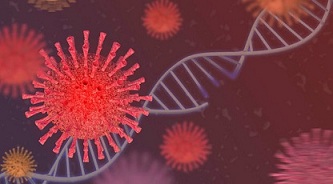Mutations-COVID-19: Study Shows That Often Ignored Mutations On Nsp4 And Nsp16 Regions Of SARS-CoV-2 Genome Plays Critical Role In Pathogenesis
Source: Mutations -COVID-19 Oct 17, 2020 5 years, 3 months, 4 weeks, 2 hours, 55 minutes ago
Mutations -COVID-19: Biologist and genomic experts from Duke University have identified a number of "silent" mutations in the roughly 30,000 letters of the virus's genetic code that helped it thrive once it made the leap to humans and possibly helped set the stage for the global pandemic. The subtle changes involved how the virus folded its RNA molecules within human cells. These silent mutations were observed on the Nsp4 and Nsp 16 regions of the SARS-CoV-2 genome.

According to the study team, tests for positive selection can identify apparently nonrandom patterns of mutation accumulation within genomes, highlighting regions where molecular function may have changed during the origin of a species. Several recent studies of the SARS-CoV-2 genome have identified signals of conservation and positive selection within the gene encoding Spike protein based on the ratio of synonymous to nonsynonymous substitution. Such tests cannot, however, detect changes in the function of RNA molecules.
The study findings were published in the journal: PeerJ.
https://peerj.com/articles/10234/
The study team the used statistical methods they developed to identify adaptive changes that arose in the SARS-CoV-2 genome in humans, but not in closely related coronaviruses found in bats and pangolins.
Lead author Alejandro Berrio, a postdoctoral associate in biologist Greg Wray's lab at Duke told Thailand Medical News, "We're trying to figure out what made this virus so unique."
Past research detected fingerprints of positive selection within a gene that encodes the "spike" proteins studding the coronavirus's surface, which play a key role in its ability to infect new cells.
Significantly the current research likewise flagged mutations that altered the spike proteins, suggesting that viral strains carrying these mutations were more likely to thrive.
However with their approach, study authors Berrio, Wray and Duke Ph.D. student Valerie Gartner also identified additional culprits that previous studies failed to detect.
The study team report that so-called silent mutations in two other regions of the SARS-CoV-2 genome, dubbed Nsp4 and Nsp16, appear to have given the virus a biological edge over previous strains without altering the proteins they encode.
Berrio said, “Instead of affecting proteins, the changes likely affected how the virus's genetic material which is made of RNA folds up into 3-D shapes and functions inside human cells.
However he admitted that what these changes in RNA structure might have done to set the SARS-CoV-2 virus in humans apart from other coronaviruses is still unknown.
However they may have contributed to the virus's ability to spread before individuals even know they have it, a crucial difference that made the current situation so much more difficult to control than the SARS coronavirus outbreak of 2003.
The study could lead to new molecular targets for treating or preventing COVID-19.
Berrio added, "Nsp4
and Nsp16 are among the first RNA molecules that are produced when the virus infects a new person. The spike protein doesn't get expressed until later. So they could make a better therapeutic target because they appear earlier in the viral life cycle."
Importantly, by pinpointing the genetic changes that enabled the new coronavirus to thrive in human hosts, scientists hope to better predict future zoonotic disease outbreaks before they happen.
Berrio further added, "Viruses are constantly mutating and evolving. So it's possible that a new strain of coronavirus capable of infecting other animals may come along that also has the potential to spread to people, like SARS-CoV-2 did. We'll need to be able to recognize it and make efforts to contain it early."
For more on
Mutations-COVID-19, keep on logging to Thailand Medical News.
